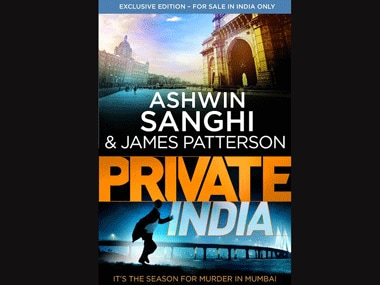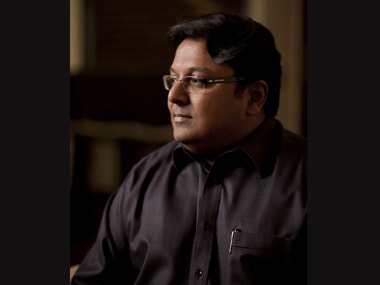It begins with a murder, goes on to take reader around town in Mumbai (with stops in exotic places like Dharavi and the Parsi Tower of Silence in Malabar Hill), and ultimately tries to find a fine balance between Hindu mysticism, current affairs issues like violence against women and the grit of an all-American spy thriller. That, in a nutshell, is James Patterson and Ashwin Sanghi’s Private India for you. Despite the fact that most bestsellers tend to seem formulaic, publishers actually tend to tear their hair out trying to crack a formula that will make people buy millions (or thousands) of copies. Random House has hit upon one that seems foolproof: take one bestselling author from the West and get them to co-author a book with a bestselling author from the East. Et voila! Let the cash registers ring across continents. [caption id=“attachment_1652829” align=“alignleft” width=“380”]  The cover of Private India[/caption] And so we have Private India, the latest installment in Patterson’s Private series in which he collaborates with an author and sets the novel in his co-author’s home country. So far, the series has seen ex-CIA agent Jack Morgan set up his detective agency in London, Berlin and other cities in America and Europe. For this Indian edition, Patterson’s partner in crime is Ashwin Sanghi, author of Chanakya’s Chant and The Krishna Key. When the collaboration was announced, Patterson said, “With its vibrant and chaotic cities, and rich history and heritage there could be no better place to set Private’s next adventure than India. And in Ashwin Sanghi, with his wide historical knowledge and his love of a fast-paced plot, there could be no better writing partner.” Sanghi wasn’t entirely sure about this collaboration when his publisher first suggested it to him. “I have written thrillers in the past but they’re all in the context of historical and mythological settings,” explained Sanghi, while talking about his initial hesitation to partner with Patterson. “I’ve written mythological thrillers, I’ve written historical thrillers, theological thrillers, but I’ve never done a pure and simple, contemporary crime thriller. So will there be enough masala in this for me to really get into it?” What clinched the deal for Sanghi is that Patterson said that Sanghi could come up with the story. This is a smart, coming from Patterson. He essentially takes on the role of an editor, tweaking the storytelling rather than deciding the plot. Meanwhile, the responsibility of writing a convincing story rests largely upon the local author, who presumably knows what kind of pop-fiction the readers in his country appreciate. Sanghi came up with a story that was, by his own admission, a response to the misogyny that has been in the spotlight ever since the December 16 gangrape. Santosh Wagh, an ex-cop and presently the head honcho of Private India, is called in when a woman is found murdered in a hotel whose security is handled by Private India. She’s a plastic surgeon from Thailand and seems to be just a tourist. But as the bodies start piling up, it becomes clear that there is a serial killer at work in Mumbai and the killer has a very precise agenda. [caption id=“attachment_1652855” align=“alignleft” width=“380”]  Ashwin Sanghi[/caption] Wagh and others from Private India get down to cracking the case. In the process, out of the Pandora’s box that is this case, out come godmen, gangsters, corrupt cops and every other cliche that you think of when you think of crime in Mumbai. Sanghi easily accepts the charge of filling Private India with almost stock characters and locations. It’s his way of presenting readers in India and abroad an engaging but informative portrait of Mumbai. “This was the first [Private] book [in India], this is not only for Indians,” said Sanghi. “This is also written for an international audience and how else do you convey a sense of the city? That yes, there is extreme poverty but there is also extreme affluence. It isn’t only the Judaeo-Christian faith that constitutes the bulk of faith around the world, that Hinduism is huge and that you also have a little minority like Zoroastrianism surviving within that city. Then I wanted to convey the underbelly, whether it’s the mafia, the cops, the political class so on and so forth.” As the investigation proceeds, Sanghi and Patterson’s story throws up red herring that are reasonably easy to spot and if you’ve read your share of thrillers (or watched a few seasons of CSI), you’ll know who the serial killer is the moment they’re first introduced. (Not surprisingly, they’re not among the early suspects.) Still, even though it isn’t much of a mystery, there are some neat bits in Private India, like the headquarters and the contrast between Private India’s high-tech gadgetry and Mumbai Police’s working conditions. At one point in the novel, Wagh and his associates rush over to the Asiatic Society and start going through manuscripts in a vague salute to The Da Vinci Code perhaps. Whatever the inspiration, it’s lovely to see old manuscripts and libraries get some love, albeit in literature. The little detour involving the ancient Thuggee cult is one of the more effective bits in the book. Sadly, this thread is snapped too abruptly and very quickly. The real problem in Private India is that after a powerful and intriguing beginning, the events in the book struggle to maintain that level of tension. Popular fiction can’t rely on elements like style and lyricism the way literary fiction can. Readers can’t be bothered with such self-indulgences. They want a story that doesn’t unravel and storytelling that doesn’t slacken. Unfortunately, both happen in Private India. As Private India goes down its Incredible India! checklist, too many elements in the thriller feel like tired cliches, beginning with Wagh, who is far too close to type. He is, like so many fictional detectives, a broken man who is brilliant, an alcoholic and works frenetically in the hope that this will help distract him from his inner demons. The city that is spread out in the book is limited, both geographically (barely any of the suburbs show up) as well as in terms of the imagination. Mumbai is a series of postcard locations rather than a real and ready-for-noir city in this thriller. Private India contains a dollop of the Hindu mythology and mysticism that Sanghi has included in all his books. “We are a culture which has almost given the world the concept of the sacred feminine – the concept of the sacred feminine did not exist outside of India,” said Sanghi, explaining why the concept of Shakti is an important theme in Private India. “We gave the concept to the rest of the world that the true power lies in the feminine. And so from that sort of a philosophy, to see that philosophy not only being not appreciated, but taken to an extreme opposite in our real lives, the entire idea of someone hating women – that was in my head.” Ironically, despite Sanghi’s genuine fascination for Shakti and sadness at the gender-inspired schizophrenia in present-day Indian society, one of Private India most glaring weakness is its attempt at a half-baked exploration into gender and identity. This is largely because the interpretation teeters between simplistic and ill-conceived. For instance, one of the characters in Private India opts for a sex change operation and becomes a man because despite being a woman, she hates women (she has mommy issues, predictably). Perhaps expecting nuance from a paperback is unrealistic, but this sort of simplification is unsettling because issues like transgender and transsexual identity need to be discussed and understood better in India. A bestseller could have been a great way to start dialogue. Instead, it just taps into the prevalent attitude of suspicion with which society treats hijras, for instance. At the crux of Private India are two threats that need neutralising. Santosh Wagh and Jack Morgan – who is bonking a senior actress on the side. For some reason, we kept imagining Rekha from about 10 years ago – must deal with a serial killer and a Pakistani terror plot. It’s almost as though the second was added in because the first wasn’t enough to hold a reader’s attention and because it didn’t give Morgan anything to do in his own franchise. Still, the terrorism sub-plot gets a far more tense and well-constructed climax than the storyline involving the serial killer. Is it unreasonable to expect a novel that’s taut and tense from the beginning to end from two bestselling authors? Apparently, yes. Read an excerpt of Private India here .
It begins with a murder, goes on to take reader around town in Mumbai (with stops in exotic places like Dharavi and the Parsi Tower of Silence in Malabar Hill), and ultimately tries to find a fine balance between Hindu mysticism, current affairs issues like violence against women and the grit of an all-American spy thriller. That, in a nutshell, is James Patterson and Ashwin Sanghi’s Private India for you.
Advertisement
End of Article


)
)
)
)
)
)
)
)
)



